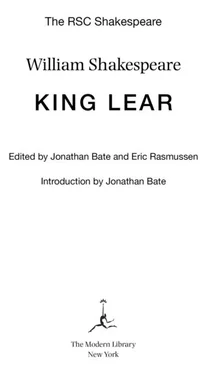уильям шекспир - King Lear
Здесь есть возможность читать онлайн «уильям шекспир - King Lear» весь текст электронной книги совершенно бесплатно (целиком полную версию без сокращений). В некоторых случаях можно слушать аудио, скачать через торрент в формате fb2 и присутствует краткое содержание. Год выпуска: 2011, ISBN: 2011, Издательство: Random House Publishing Group, Жанр: Старинная литература, на английском языке. Описание произведения, (предисловие) а так же отзывы посетителей доступны на портале библиотеки ЛибКат.
- Название:King Lear
- Автор:
- Издательство:Random House Publishing Group
- Жанр:
- Год:2011
- ISBN:978-1-58836-828-7
- Рейтинг книги:3 / 5. Голосов: 1
-
Избранное:Добавить в избранное
- Отзывы:
-
Ваша оценка:
- 60
- 1
- 2
- 3
- 4
- 5
King Lear: краткое содержание, описание и аннотация
Предлагаем к чтению аннотацию, описание, краткое содержание или предисловие (зависит от того, что написал сам автор книги «King Lear»). Если вы не нашли необходимую информацию о книге — напишите в комментариях, мы постараемся отыскать её.
King Lear — читать онлайн бесплатно полную книгу (весь текст) целиком
Ниже представлен текст книги, разбитый по страницам. Система сохранения места последней прочитанной страницы, позволяет с удобством читать онлайн бесплатно книгу «King Lear», без необходимости каждый раз заново искать на чём Вы остановились. Поставьте закладку, и сможете в любой момент перейти на страницу, на которой закончили чтение.
Интервал:
Закладка:
Thrown to the wilderness by his family, Edgar evolves from “worm” to potential king. His suffering appears as a barbaric initiation rite designed by the toughest of gods. It is a trial of cruelty fitting for the evil world that is unleashed in the play.
The Absence of Humanity
King Lear is a play rich with vicious bestial images, all symbolic of the barbaric capabilities of man and woman. Goneril, for instance, is described as having a “wolfish visage.” Edward Topsell’s Historie of Foure-footed Beastes (1607) mixed scientific fact, folklore, and classical allusions to animals and mythological creatures, giving them often exotic and fantastic attributes. It describes the customary attributes associated with the wolf in animal lore: treachery, deceit, hypocrisy, ravenousness, and cruelty. These associations gave Shakespeare’s audience an accurate idea of Goneril’s character and her subsequent behavior. However, for modern directors, “Another interpretative decision that must be faced … is whether to accept the moral polarity of Lear’s daughters as a fact of the story or to suggest more naturalistic reasons for their behavior.” 46
In recent years patriarchal repression and child abuse of one form or another have often been regarded as the defining reasons for evil in children. Lear has accordingly been portrayed as physically and mentally abusive or neglectful, demanding, cantankerous, a bully who has created so much pent-up anger in his two elder daughters that it erupts when they are given the opportunity to release their feelings without recrimination; that is to say, when they are in power.
In the influential 1962 production, Peter Brook portrayed Lear’s knights as rowdy and destructive, while Irene Worth’s Goneril was self-contained and cool, remonstrating with Lear in measured tones, speaking as somebody with cause to complain. Some critics thought such a treatment a distortion of the text, but most modern directors have followed this interpretation to some degree. Though it helps to humanize Goneril, it does make the descent into evil very difficult to portray.
Janet Dale, who played the part in 1993, admitted that “I am trying to play her with a conscience, but I suspect the lines won’t support it.” Rather than an outright evil woman, she wished to portray her as a woman “of moral degeneration.” 47
By focusing on the psychology of these extremely dysfunctional families, the violence in Nicholas Hytner’s 1990 production became rooted in explainable terms:
The production is about confused people destroyed by their incomprehensible emotions or, as with Wood’s massively erratic Lear, struggling through new ones.… The effects of long abuse are evident in his daughters. Alex Kingston’s Cordelia has become rebellious, bloody-minded and rejects Lear almost more than he does her. Estelle Kohler’s Goneril and Sally Dexter’s Regan, seem still to want the love of this old, impossible man.… It is fashionable nowadays to allow us to see the “bad” daughters’ point of view, but rarely as strongly as here. Both of them seem badly in need of Valium, psychoanalysis, or both. They are frustrated, exhausted, at the end of a tether which finally breaks, liberating all that suppressed anger and barely contained madness. Their evils proliferate, but they, like Goneril and Regan themselves, are ultimately Lear’s fault. 48
Order opens up to reveal chaos. And the same pattern is visible in erratic human behaviour. Lear, having cursed Goneril with sterility, rushes back to embrace her. Astonishingly, Regan first conspires in the blinding of Gloucester and then tenderly asks him, rather than her wounded husband, “How dost my lord?” Mr. Hytner ushers us into a morally topsy-turvy universe in which good and evil frequently cohabit within the same person. 49
One cannot escape the fact that what Regan and Goneril do is evil and unnatural. In Buzz Goodbody’s 1974 production, which cut the role of Cornwall, “Regan put out Gloucester’s eyes unaided, with a broach.” 50Modern stagings of the blinding scene nearly always show Regan’s active participation in the mutilation of Gloucester. Emily Raymond, who played Goneril in 2004, felt that Goneril and Regan “had a brutal upbringing—[with] smacks of physical violence and mental abuse. I think Lear probably took his daughters to hangings and taught them the brutal way to deal with traitors—you don’t hang them, you pluck out their eyes and let them live, to serve as a deterrent to others.” 51
What impact does it have to turn the violence and evil in Lear into something psychological instead of metaphysical? Does the implication that it is somehow the “natural” result of a bad, neglected upbringing diminish the epic nature of the play and the horrific impact of the sisters’ monstrous acts? Lear’s world is thrown out of order by his inability to be an adequate father and king . James I, in his publication The True Law of Free Monarchies , underlined the divine right of kings and the duty of all monarchs to treat their subjects as a caring father would do his children. Lear’s misunderstanding of his role as a fixed point in the natural order of things and his irresponsibility in relation to his position in society unleash unnatural chaos.
In 1993 Adrian Noble emphasized violent cosmic forces prevalent in the play by use of an abstract but symbolic set:
When David Bradley’s superlative Gloucester, his eyes gouged out, staggers away from the scene of atrocity and from Simon Dormandy’s chillingly, psychopathic Cornwall, the focus clears at last. Noble used the Folio edition of the text, so cutting the aid of Gloucester’s servants after the blinding. The sightless Bradley gazes in the direction of a blue and white model of the globe, fixed above the stage. As he stares, a crack runs across the globe’s circumference and the sands of time begin to pour out of it. The society of King Lear, with family life collapsing in warfare and inhuman cruelty … is ominous of all civilized human life ruined and coming to an end. 52
In this bleak vision,
Noble’s most original stroke is to suggest that the cruelty unleashed by Lear’s folly spreads to even the conventionally good characters. The chief beneficiary is Simon Russell Beale’s extraordinary Edgar who starts as goody-two shoes and who is turned by the horrors he has witnessed into a symbol of revenge. In this production he doesn’t just kill Oswald; he batters his face with a staff as if in retaliation for the blinding of his father. The most unplayable major role in Shakespeare suddenly acquires a specific identity: a man forever tainted by the contagion of violence. 53
In his final battle with Edmund, Russell Beale as Edgar tried “to rip out the dying Edmund’s eyes in reprisal.” 54Similarly, Bill Alexander’s 2004 production included “chilling touches that alert you afresh to the barbarism of its world. For example, in the climactic duel between Edmund and Edgar, it’s only chance that stops the virtuous brother from exacting primitive ’eye for an eye’ justice” 55—“In order to force Edmund to drop his arms, [Edgar] grabbed him by either side of his face and pushed his thumbs into his eyes. This reference to the blinding of Gloucester was eerily resonant.” 56
Our opinion of Edgar will determine how we consider the end of the play. His spiritual journey, which echoes Lear’s, provides him with a unique understanding of humanity and the preciousness of life. But he is also a very human avenger who has to set the world right and provide hope for the future. To overbalance his character with deliberate malicious and violent action furthers a nihilistic vision of the play by removing the certainty of redemption for a lost and barbaric world. Adrian Noble in 1982 stressed this element of unredeemed cruelty. The Guardian critic Michael Billington explains:
Читать дальшеИнтервал:
Закладка:
Похожие книги на «King Lear»
Представляем Вашему вниманию похожие книги на «King Lear» списком для выбора. Мы отобрали схожую по названию и смыслу литературу в надежде предоставить читателям больше вариантов отыскать новые, интересные, ещё непрочитанные произведения.
Обсуждение, отзывы о книге «King Lear» и просто собственные мнения читателей. Оставьте ваши комментарии, напишите, что Вы думаете о произведении, его смысле или главных героях. Укажите что конкретно понравилось, а что нет, и почему Вы так считаете.












